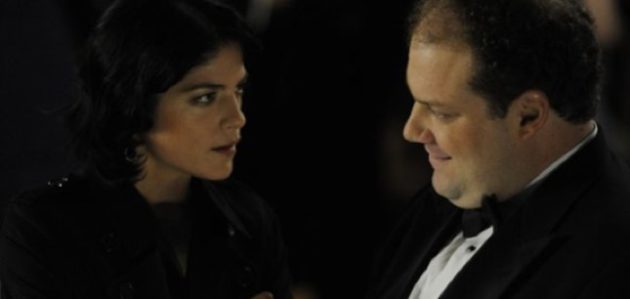REVIEW: Todd Solondz Spins a Tale of an Unlovable But Compelling Loser in Dark Horse

Dark Horse is a romance and a comedy in the way that Titanic is a movie about a boat trip. The latest film from Todd Solondz, that auteur of misery masquerading as humor, Dark Horse is about a 35-year-old named Abe (Jordan Gelber, who's halfway between Jeff Garlin and Vincent D'Onofrio) who still lives at home with his parents (Christopher Walken and Mia Farrow) and works at the real estate development office his dad owns. With his receding hairline and paunch, Abe is an undeniably aging guy existing in a limbo of arrested development -- he's a man-child, but in a creepily realized way, a corpulent adult acting like a teenager, looking painfully out of place in his T-shirts and childhood bedroom adorned with action figures.
Solondz's career has slowed since his '90s hits, including Welcome to the Dollhouse and 2001's Storytelling. While skipping the more shocking turns of something like Happiness, Dark Horse does feel like a return to the fearless darkness of those earlier films, a tale of a loser who's fully drawn but never allowed to be lovable. Abe didn't leave home, and in the opening scene of the film, at a wedding, he meets what he hopes is his match in Miranda (Selma Blair, listed in the credits as "formerly 'Vi'," the character she played in Storytelling), who's recently crawled home in defeat.
Miranda doesn't pretend to be in any way interested in him, but he's persistent and she's depressed and unable to resist, though she does forget their first date and is away at the grocery store when he comes to see her; she also spends a chunk of their second date lying facedown on her bed. Despite this show of indifference, he proposes to her, and she accepts, telling him that after a Skype chat with her ex, Mahmoud (Aasif Mandvi), she realized she should stop trying to slit her wrists, give up on her literary career, hope and ambition, and just get married and have children. When they kiss for the first time, Miranda says that it "could have been so much worse." A grand romance, it is not.
Abe is pathetic, but Dark Horse doesn't allow him to be pitiable. "I know that life has been unfair to you because it has given you every possible advantage," points out a character in one of several dream sequences that suggests Abe has more self-awareness than he lets on, "so your feelings of inadequacy are endless and unrelenting." There's no particular reason that Abe has failed to leave the nest -- he has been given all the same starting material as his younger brother, Richard (Justin Bartha), a successful doctor Abe naturally resents. Abe is lazy, self-conscious and defensive; he rationalizes away his situation as being the fault of an unjust world, of his father being an asshole and his mother loving his sibling more, things that we see aren't true.
Abe thinks of and describes himself as a "dark horse," a term his dad applied to him growing up -- the underdog, the unexpected candidate. But he isn't in a Judd Apatow production, he's in a Todd Solondz film, one that provides the same kind of bracing counterbalance to man-child genre tropes as Welcome to the Dollhouse did to teen comedies in which the outcast kid makes good. Abe doesn't seem likely to pull himself out of the stagnation in which he's wallowing, and he doesn't really want to. The most resonant and most repugnant thing about the character is the way in which he feels he's owed some kind of success without wanting to do the work -- if it hasn't arrived yet, that has to be because of the actions of others. "I know my problems better than anyone, and there's no solution!" he barks at his concerned mother when she suggests he go back to therapy. Like other women in his life, she flutters over him in concern, undermining any firmness from his father so that they cancel each other out.
Dark Horse is set in a New Jersey that's been made into a bland purgatory of suburban sprawl -- one of the film's several memorable slow pans across a room tracks from face to face of Abe and Miranda's parents, meeting for the first time as soon-to-be in-laws, and discussing in idle detail whether taking I-95 or the Parkway would have been a better route to get where they already are. Abe drives a Hummer, compulsively drinks Diet Cokes and works to help his father manage strip malls, always late on getting spreadsheets together because he's looking for Thundercat figurines on eBay.
It's a just-heightened world that becomes so stifling by the end that you want to run screaming out the door and not stop until you reach the state lines. Dark Horse's most important scene takes place in an empty Toys "R" Us in which Abe tries repeatedly to return an item the store won't accept. It's a nightmarish but poetic moment in which the film's themes come strikingly together -- this is a man who's crippled by the imperceptible things he thinks he's been denied. Life, however, doesn't come with a receipt.

Comments
Sounds like a male version of Young Adult.
l love dancing and singing
"bland purgatory of suburban sprawl" That's a great line. I will never think of Toys"R"Us the same way again. Oh wait but he blurred out the name, right?! So who's to say where he was...lol